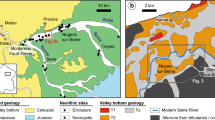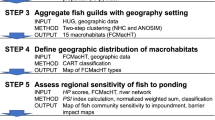Abstract
MORTLAKE on the Thames has a place-name which not only accords with the natural history of the place, but also supplies a word which might conveniently be brought into common use to signify a process which plays an important part in the development of every river system, just as the River Meander supplies a word to signify the windings of any river. The area between Barnes and the Thames was formerly an island in the river (Fig. 1), formed by a division of the stream into a northern and a southern arm reunited at the down-stream ends. The southern arm is now incomplete; the part of it remaining is included in the line of the Beverley Brook, which, having come from the south, turns to the east round a bold curve and joins the Thames. This leaves a gap between the convexity of the curve and the river at the point where it previously divided. This gap now forms the isthmus of a peninsula into which the island has been converted by the partial effacement of the southern arm of the divided river. Here Mortlake stands. It is on or near to the former line of the stream which has been in part effaced. This part has become a dead stream—a mortlake, the word “lake” having been used in the Middle English sense as signifying a stream. Leland the Ghronicler wrote that “there runneth a praty lake out of Sudeley Parke down by the Gastle and runneth into Essebourne Brook at the south syde of Winchcombe.” And again: “I passed over 2. or 3. small lakes betwixt Chiltinham and Gloucester and they resort to Severne.” The word is still used in some places as meaning a stream; children on the Severn banks still sing of the moon as claiming to guide the ship “up the lake.”
This is a preview of subscription content, access via your institution
Access options
Subscribe to this journal
Receive 51 print issues and online access
$199.00 per year
only $3.90 per issue
Buy this article
- Purchase on Springer Link
- Instant access to full article PDF
Prices may be subject to local taxes which are calculated during checkout
Similar content being viewed by others
Author information
Authors and Affiliations
Rights and permissions
About this article
Cite this article
ELLIS, T. Mortlakes as a Cause of River-windings. Nature 105, 264–265 (1920). https://doi.org/10.1038/105264b0
Issue Date:
DOI: https://doi.org/10.1038/105264b0
Comments
By submitting a comment you agree to abide by our Terms and Community Guidelines. If you find something abusive or that does not comply with our terms or guidelines please flag it as inappropriate.



